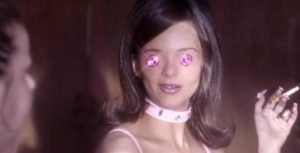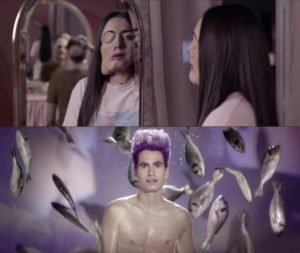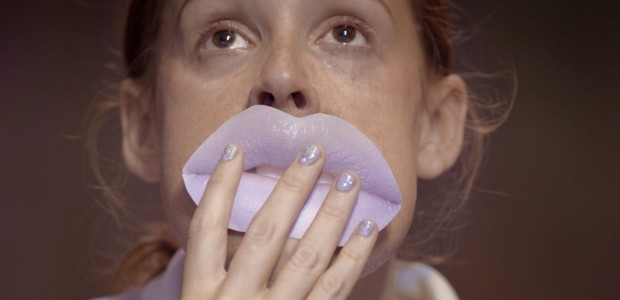
Promotional material for genre films are always meant to startle, disturb, or otherwise titillate. Failing that, they at least intend to be eye-catching. For better or worse, this usually means plastering the most visually abnormal (read: disabled) character front and center of a poster or trailer, regardless of how much time they spend in the film itself. Nothing guarantees word of mouth like the shock factor, and nothing sells a product better than word of mouth. You see this tactic employed all the time. Most recently I’ve seen it the heaviest at the hand of Ari Aster, from HEREDITARY’s centering Charlie to MIDSOMMAR’s inclusion of Ruben despite his brief and more-or-less token appearance in the film itself. This approach can often lead to misrepresentation of the film’s story, allowing for all kinds of mixed reactions and interpretations. Sometimes this is one of the best ways to get people in the seats, but occasionally it backfires. The visual intended to lure people in will push them further and further out and drive audiences away. Word of mouth giveth, word of mouth taketh away.
As a disabled genre film lover, I find myself approaching these kinds of promotions with a grain of salt. If you want me to watch a movie all you have to do is tell me it contains or features a disabled character and I will happily give it a chance no matter the previous reception. But featuring my community for the sake of shock always kind of sticks in my craw. Perhaps the most insane example of ambitious marketing backfiring in the court of public opinion is Eduardo Casanova’s 2017 Spanish drama SKINS, which alternates between several different but ultimately connected disabled stories and perspectives. Promotional material that circulated around social media primarily focused on Samantha (Ana Polvorosa)—referred to in one bit of IMDb trivia as the “Bottoms Up Girl”—who’s mouth and anus are reversed on her body. She is by far the most visually unusual character of the whole film and was laughed up and down the halls of social media for days without anyone seeming to have actually spent time watching the film itself. It’s possible she might have been a comical figure meant to balance out the sheer weight of the rest of the storylines, but hers is so ultimately tragic I find even that argument a little hard to stomach.
One of the most common responses to being made uncomfortable is to laugh and share the thing that set us off with others, so it’s not as if the social media laughingstock storm was unusual or even necessarily surprising. But from what I could tell, it worked more to push people away because they did not want to have to look at Samantha than it ever had a chance of doing to draw people in. It generated conversation, but that conversation was so full of shock and revulsion there was no room for genuine curiosity. Anthropologist and fan that I am, I tracked the film down to Netflix and watched it after three days of watching people rake it through the coals. What I found was not some scandalous comedy about dramatically and hysterically disfigured people, but a deeply sad and heartfelt meditation on shame, acceptance, and a society that stays ready to shun anyone who looks or needs to function outside the norm.
Each of the characters in SKINS is looking for love and acceptance and trying to cope with their own shames and anxieties that lie at the root of their experiences. In addition to Samantha, who is constantly pressured by her father not to go out without covering her face lest people show their true colors and she be hurt, there is Laura (Macarena Gómez), a sex worker born without eyes who pins pink diamonds in their place before getting to work; Cristian (Eloi Costa), who has a body dysmorphia disorder that makes him believe he would be better off without fully functioning legs; Guille (Jon Kortajarena), a burn victim desperately seeking reconstructive facial surgery; Ana (Candela Peña), whose face is half disfigured and sloping downward; and Vanesa (Ana María Ayala), a woman who wants nothing more than to have a baby and must reckon with her feelings that her baby will also have dwarfism. Peppered throughout these core stories are several other abnormal characters, who range from relatively harmless to morally abhorrent.

I cannot say for sure exactly how many of the people who dragged this film out on social media actually watched it, but if Letterboxd is anything to go by, it’s still seeking an audience willing to look beneath its surface.
On one hand, SKINS’ tragedy-tinged heart beats with love and shirks the idea that we should be ashamed of our bodies. It depicts both aging nudity and disabled sex without ever even batting an eye, confronting its audience with the intimacy we expect to see from youthful, able bodies all the time. On the other, it continually hammers home the horrors disabled people face as a consequence of their extra-ordinariness. Samantha is laughed at and raped, Ana and Laura are fetishized, Cristian is shirked by his mother as a disobedient freak, Vanesa is tokenized and very nearly made to have an abortion so that she would not miss work as a pink bunny tv personality, thereby keeping her boss’s income and advances rolling in. For every tragic figure there seems to be an equally strong and unapologetic counterpart, allowing space for all manner of disabilities and all levels of personal acceptance. They also all have relatively happy endings—with the potential caveat that, with enough thought into previous scenes, Samantha is still given the short end of the stick when she ends up with a man who admits he is primarily attracted exclusively to disabled women. Nothing wrong with this in theory, of course, except that his previous admission is read as fetishization rather than genuine love for his prior partner as a whole.
Watching a film like SKINS as a disabled person is likely an entirely different experience than watching it as an able-bodied audience member. Where most laughed, I primarily found kinship. In each of their struggles with social and personal shame I saw a step along my own journey of acceptance. Cristian’s relationship to his legs was unexpectedly hard-hitting for me personally, having spent most of my younger years ashamed of the scars and the ways my bones settled so that I could not walk in quite the way I dreamed of. It’s a pastel-soaked dream journey through the ways in which disabled people engage with themselves and the world, and a surprisingly poignant, wholly unorthodox tale of self-love in all its forms.
It can sometimes be a thorny thing to say one should go against the popular ideas of what is good and worth watching. Offer something universally panned as a favorite and you’re more than likely to incur the wrath of random internet trolls. I won’t tell you this is necessarily a personal favorite—and it prides itself on being an uncomfortable watch—but I can say it is worth more time and attention than it seems to have been given on initial release. Casanova and crew know the kind of story they are seeking to tell and, for all its bumps, they do it well. It’s been five years now, I think we’re well at time to give SKINS another chance.
Tags: Ana Maria Ayala, Ana Polvorosa, Ari Aster, Body Horror, Candela Pena, Disability, Eduardo Casanova, Eloi Costa, Hereditary, Jon Kortajarena, Macarena Gomez, Midsommar, Netflix, Skins



No Comments